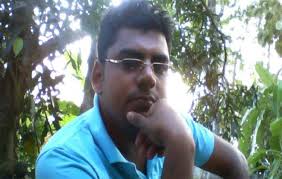Sri Lanka – jailed for writing a short story, help #FreeShakthika
For over 80 days, Shakthika Sathkumara, an award-winning Sri Lankan writer and poet, has been held in police custody.
| Suggested Reading | Conflict Background | GCCT |
By the Sri Lanka Campaign for Peace and Justice
For over 80 days, Shakthika Sathkumara, an award-winning Sri Lankan writer and poet, has been held in police custody.
The reason for his detention? The publication of a fictional short story about life in a Buddhist temple; a story which allegedly alludes to child sexual abuse involving members of the clergy.[1]
Shakthika’s arrest on 1 April 2019 followed a series of complaints to police by Buddhist organisations. He has been charged under the ICCPR Act – a piece of legislation that is, somewhat paradoxically, designed to give effect to the government of Sri Lanka’s obligations under international law to protect freedom of expression.

Lawyers and human rights experts have roundly condemned the arrest as a gross misapplication of the law, emphasising that the relevant section under which Shakthika has been charged is clearly aimed at tackling the incitement of violence on the grounds of religion, race or nationality – and not merely causing religious offence or insult.
While a legal challenge is now well underway, Shakthika’s freedom continues to be denied ahead of trial; a trial which he seems almost certain to win on a proper and impartial reading of the law. At his latest hearing at a magistrate court on Tuesday (18 June), he was yet again remanded, with a further hearing due to take place next week (on 25 June).
The growing suppression of free speech with free speech legislation
Unfortunately, the ongoing detention of Shakthika appears to be not an isolated injustice, but rather part of a wider coordinated assault on freedom of expression by hardline – but influential – Sinhala Buddhist groups on the island; an assault that has gained in intensity following the Easter Sunday bombings.
In May, a Muslim woman, Abdul Raheem Masaheena, was arrested under the ICCPR Act for wearing a shirt depicting a ship’s helm, an image which complainants to the police had wrongly suggested was a Buddhist symbol, the dharmachakra. Then last week – also under the Act – the authorities threatened to move an investigation against Kusal Perera, a respected journalist whose alleged wrong-doing consisted of the mere mention of growing Sinhala Buddhist extremism on the island. These recent incidents take place against the backdrop of years of sustained harassment and targeting of Tamil journalists and activists under the current regime, as recently manifested in the appalling hate campaign against Tamil Guardian editor, Thusiyan Nandikumar.

The latest crackdown on freedom of expression under the auspices of the ICCPR Act in Sri Lanka are rendered all the more outrageous and frustrating by the government’s abject failure to hold to account the perpetrators of actual recent identity-based violence, as well as those inciting it in plain sight. This week’s latest remarks from one of the seniormost figures in the Buddhist clergy in Sri Lanka suggesting some Muslims should be stoned to death – deemed “classic pre-genocidal language” by staff from the International Crisis Group – have scarcely been remarked upon by Sri Lanka’s leaders, let alone investigated by the authorities. Last month, another extremist monk, then serving a jail sentence for contempt of court having threatened a disappearances activist, received a Presidential pardon and was released.
In the wake of recent attacks against members of Sri Lanka’s Muslim community, the potential consequences of these recent developments – both for freedom of expression, and the risk of further violence against Sri Lanka’s minority communities – are deeply worrying. Of further concern, the government has signalled an intent to bring forward an unnecessary and potentially oppressive hate speech law, a move which could further embolden those currently attempting to curb free speech on religious grounds.
Take action
Please help bring an end to the ongoing injustice of Shakthika’s detention – and ensure that a line in the sand is drawn against the current surge of attacks on freedom of expression in Sri Lanka – by acting now. There are two suggested ways in which you can lend your support:
- Send an email or letter to the Sri Lankan authorities urging them to immediately release Shakthika. English PEN, a human rights organisation, have put together a handy short list of demands around which you can frame your correspondence. They have also compiled a list of key contact details – including those for the offices of the Sri Lankan President, Prime Minister and Ministry of Justice – to which you can direct it.
- Get creative. In the spirit of artistic freedom, create a banner, poster or work of art bearing the hashtag #FreeShakthika – then share it on social media and give us a heads up. If you’re in need of some inspiration, check out some of the campaign visuals deployed at the vibrant protest held in support of Shakthika in Colombo earlier this week (for example, see here, here and here). Alternatively take and share a photo snap of yourself with this campaign print-out.
The Sri Lanka Campaign for Peace and Justice is a member of the Global Coalition for Conflict Transformation, which is comprised of organizations committed to upholding and implementing the Principles of Conflict Transformation.
This article was originally published on the Sri Lanka Campaign website and is available by clicking here. The views expressed do not necessarily represent those of TransConflict.
Footnotes
- A phenomenon which has been widely reported on in recent years, including by the BBC.
Interested in writing for TransConflict? Contact us now by clicking here!




















